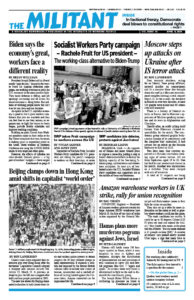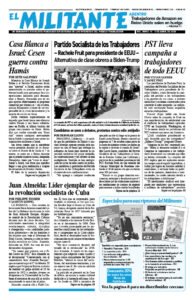Four terrorist attackers, acting for an Islamic State group offshoot, sprayed gunfire on concertgoers and lit a massive blaze that brought down the roof in a Moscow entertainment complex hosting a rock concert March 22. In the assault, the deadliest in Russia in over two decades, at least 139 people were killed and 60 others critically wounded.
There is a history of Islamist attacks in Russia, tied to Moscow’s oppression of Muslim minorities and its wars in Afghanistan and Chechnya.
Shortly after, an outfit calling itself Islamic State Khorasan claimed responsibility for the attack. The reactionary group released graphic body-camera footage of its combatants and the slaughter they unleashed. It had carried out an attack on the Russian Embassy in Kabul in 2022.
Two days later, four captives appeared in a Russian courtroom showing signs of severe torture. All are from Tajikistan, aged 19 to 32. One had had his ear severed and shoved in his mouth. Another was unconscious on a stretcher. They were charged with acts of terrorism.
A total of 11 suspects are being held, with others from Kyrgyzstan, which like Tajikistan is in mainly Muslim Central Asia.
From the outset, Russian President Vladimir Putin seized the opportunity to direct public anger toward Ukraine, seeking to bolster support for what he now admits is a full-fledged war against the Ukrainian people.
The assault in Moscow came two weeks after the U.S. Embassy there warned the Kremlin of intelligence concerning a possible terrorist attack. It also publicly alerted U.S. citizens in Russia to stay away from any large gatherings.
Amid heightened international tensions and growing opposition at home against his Ukraine war, Putin dismissed Washington’s alert as “blackmail” trying to “intimidate and destabilize our society.” And he claimed Kyiv had switched to “terrorist tactics.”
The Islamic State group has long threatened terror attacks inside Russia in retaliation for Moscow’s intervention against it in Syria. Moscow has used its air power against civilian targets there to shore up the Bashar al-Assad regime since 2015. In recent months, the Russian air force has aided the Syrian military in intensifying attacks against Islamic State strongholds.
Admitting “the crime was carried out by radical Islamists,” Putin said the Kremlin was also targeting those “who ordered” the attack, asking people to consider, “Who benefits from this?”
The Russian president claimed the assailants were caught trying to flee to Ukraine, where “a window for crossing the border was prepared for them.” Kyiv officials have vehemently denied any involvement in the attack.
Belarusian President Alexander Lukashenko said March 26 that the attackers tried fleeing to his country first, but “there was no way they could enter Belarus.” So, he said, they turned away toward the Ukrainian-Russian border. This contradicts Putin’s claims the assailants planned to seek refuge in Ukraine.
Russian state television dismissed the Islamic State group’s claims of responsibility, suggesting it was a “false flag” operation by Ukraine. The head of the Federal Security Service (FSB), the Russian spy agency, claimed the terror act by “radical Islamists” was “facilitated by Western special services and Ukraine’s special services.”
Putin’s cozy relations with Hamas
Putin hopes he can buy protection from Islamic State’s hostility by showing Moscow’s increasingly cozy relationship with Hamas, and opposition to Israel’s war in Gaza in response to Hamas’ Oct. 7 pogrom in Israel.
“Are radical and even terrorist Islamic organizations really interested in striking Russia, which today stands for a fair solution to the escalating Middle East conflict?” he asked March 25.
Russia has suffered at least 15 terrorist attacks since Putin’s rise to power, beginning in 1998 when he became head of the political-police FSB agency. While few have been as deadly as this most recent assault, they were successfully seized on by Putin to strengthen his grip on power.
While hurling “terrorism” accusations against Ukraine, Moscow unleashed its latest deadly round of aerial bombardment against Ukrainian cities and infrastructure March 25.
In a March 23 statement, the Confederation of Free Trade Unions of Ukraine denounced this “missile terrorism,” which is “causing civilian casualties, including workers at their workplaces, and is actively destroying Ukraine’s economy and energy industry on a daily basis.”
Instead of demoralizing the Ukrainian people, Putin’s continuing assaults have strengthened their resolve to repel the invaders.

